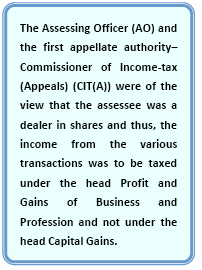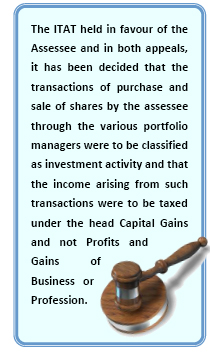|
|||||||||||||||
| Transactions in Shares through a PMS - Business Income or Capital Gains? | |||||||||||||||
|
|||||||||||||||
Dispute with the tax department The Assessing Officer (AO) and the first appellate authority– Commissioner of Income-tax (Appeals) (CIT(A)) were of the view that the assessee was a dealer in shares and thus, the income from the various transactions was to be taxed under the head Profit and Gains of Business and Profession and not under the head Capital Gains. Revenue’s Contention before the ITAT
Assessee’s Contention:
The Decision of the ITAT
Based on the above, the ITAT held in favour of the Assessee and in both appeals, it has been decided that the transactions of purchase and sale of shares by the assessee through the various portfolio managers were to be classified as investment activity and that the income arising from such transactions were to be taxed under the head Capital Gains and not Profits and Gains of Business or Profession. Our Comments As mentioned at the beginning, such disputes are fact specific and each case would need to be decided on a case to case basis. However, in a large number of cases where the investors have appointed professional portfolio managers to handle their investments, this decision would be very useful as this is probably the first such case to be decided where the tax officer has held PMS transactions to be business transactions and where the ITAT has, by way of a speaking and detailed order, rejected such a stand. |
|||||||||||||||
|



 role in the same.
role in the same.